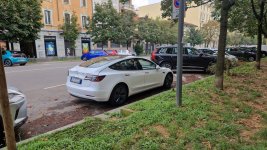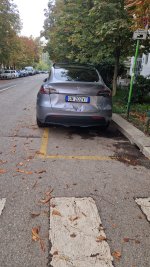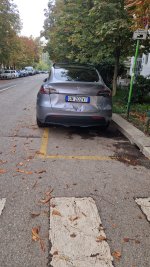I spotted two rear-ended Teslas in front of my house, few meters apart. Just a coincidence or an emerging safety trend?
Months ago, I was reading about people complaining that regen braking often delays the onset of brake lights.
I started looking at my screen more often, to see when brake lights go on, didn't notice particular anomalies.
Then I started looking at other Teslas and noticed that older M3 and MY during the day don't fully lit the brake lights, only a tiny inner segment, barely noticeable in very bright sunny days. While at night they should lit up the whole perimeter, making the braking action more evident.
What's your view on this? Ever experienced sudden braking of other Teslas without braking lights?


Months ago, I was reading about people complaining that regen braking often delays the onset of brake lights.
I started looking at my screen more often, to see when brake lights go on, didn't notice particular anomalies.
Then I started looking at other Teslas and noticed that older M3 and MY during the day don't fully lit the brake lights, only a tiny inner segment, barely noticeable in very bright sunny days. While at night they should lit up the whole perimeter, making the braking action more evident.
What's your view on this? Ever experienced sudden braking of other Teslas without braking lights?




